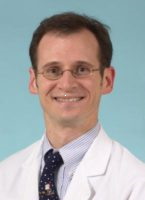Dr. Reeds graduated with a B.A. in Biochemistry from the University of Texas at Austin, then completed medical school at Texas Tech University where he was elected to the Alpha Omega Alpha honor society. He went on to the University of Rochester/Strong Memorial Hospital for residency and chief residency in Internal Medicine.
He then moved to Washington University in St. Louis, to receive fellowship training in Endocrinology, Diabetes and Metabolism under the mentorship of Dr. Samuel Klein. Following fellowship, he received a K23 award from NIH to examine the pathogenesis of metabolic abnormalities in HIV. He subsequently received a Doris Duke Clinical Scientist Development Program Award. He received R01 funding from NIH to examine treatment for Protease-Inhibitor Associated Endoplasmic Reticulum Stress in HIV. Dr. Reeds is an expert in clinical nutrition and has been a recipient of the American Society of Nutrition Physician Nutrition Support Specialist award. He has served as Director of the Barnes Jewish Hospital Nutrition Support Service for 15 years. He is an experienced educator and a recipient of the Distinguished Service Teaching Award. He has active research efforts aimed at developing clinical research training programs to support sustainable programs for managing metabolic complications of HIV in Rwanda. He is active in both global and local community-health projects to improve prevention and management of cardiovascular risk factors including hypertension, type 2 diabetes and obesity by leveraging the resources of community health workers and nurses in Federally Qualified Health Clinics.
Dr. Reeds is a dedicated leader in clinical research and education at Washington University School of Medicine. He serves as Medical Director of the Clinical Research Unit, co-Director of the Master of Science in Clinical Investigation Program, Associate Director of the Mentored Training Program in Clinical Investigation and Director of the Washington University KL2 program. He has a focus on assisting early-stage investigators through his roles as Director of the Pilot and Feasibility Programs for the Nutrition and Obesity Research Core and the Center for Diabetes Translation Research and Director of the Longer Life Center at Washington University. He has mentored more than 20 early-stage investigators and is a regular member of several NIH study sections.
